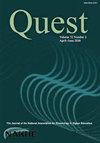谁的知识最重要?研究适应性体育活动研究的范式趋势
IF 1.7
3区 教育学
Q2 EDUCATION & EDUCATIONAL RESEARCH
引用次数: 1
摘要
谁是专家?谁的知识有价值,哪些知识是为谁、由谁产生的?因此,谁的知识被边缘化了?这些都是与适应性体育活动(APA)领域相关的关键问题。在认识论和伦理责任的指导下,本研究的目的是通过对APA范式趋势的广泛回顾来回答这些问题,并报告残疾人士在APA研究中的角色,而不是作为参与者。在认识论的层面上,我们不仅报告了该领域的现状,还揭示了APA研究以何种方式可能或可能不受其所服务和支持的人们的关注和需求的指导。基于这些发现,我们讨论了参与性研究及其与APA的相关性。本文章由计算机程序翻译,如有差异,请以英文原文为准。
Whose Knowledge Counts? Examining Paradigmatic Trends in Adapted Physical Activity Research
ABSTRACT Who is the expert? Whose knowledge counts and what knowledge for whom and by whom is produced? Consequentially, whose knowledge is marginalized? These are critical questions to ask in relation to the field of Adapted Physical Activity (APA). Guided by epistemic and ethical responsibility, the purpose of this study was to respond to these questions through an extensive review of the paradigmatic trends in APA and to report on the roles of people experiencing disability in APA research other than as participant. Attending to the level of epistemology, we go beyond reporting the state of the field to reveal in what ways APA research may or may not be guided by the concerns and needs of the people it is intended to serve and support. Building on the findings, we discuss participatory research and its relevance to APA.
求助全文
通过发布文献求助,成功后即可免费获取论文全文。
去求助
来源期刊

Quest
社会科学-运动科学
CiteScore
4.50
自引率
14.30%
发文量
16
期刊介绍:
Quest is the official journal of the National Association for Kinesiology in Higher Education (NAKHE). It is the leading journal for interdisciplinary scholarship for professionals in kinesiology in higher education. Quest provides a public forum for scholarship, creative thought, and research relevant to a broad range of interests held by faculty and leaders in higher education today.
Quest publishes: 1) manuscripts that address issues and concerns relevant and meaningful to the field of kinesiology; 2) original research reports that address empirical questions that are contextualized within higher education and hold significance to a broad range of faculty and administrators in kinesiology; and 3) reviews of literature and/or research of interest to one or more sub-disciplines in kinesiology. Quest does not publish papers focused on sport (e.g., amateur, collegiate, professional) that are contextualized outside of kinesiology in higher education.
 求助内容:
求助内容: 应助结果提醒方式:
应助结果提醒方式:


